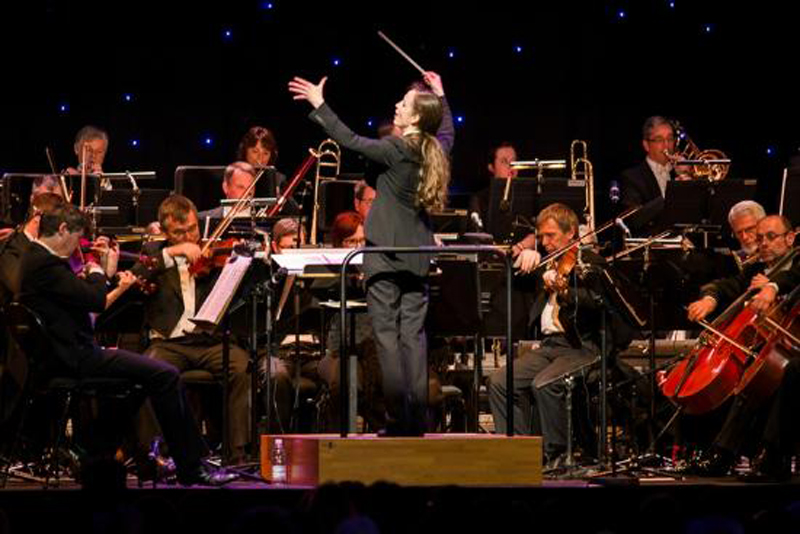RCS / Opera Double Bill

Alexander Gibson Opera School, RCS, Glasgow
This wasn’t an evening of rip-roaring thrills and spills, as opera so often is. Instead, a small student cast and instrumental ensemble from the Royal Conservatoire of Scotland, in the flexible intimacy of the Alexander Gibson Opera School, took on the audacious challenge of a double bill of introspective chamber operas by Michael Nyman and Gavin Bryars in which darkness and subdued intensity are the connecting thread.
Neither work – Nyman’s pseudo-Freudian The Man Who Mistook His Wife for a Hat, and Bryars’ melancholic Marilyn Forever – is over-concerned with narrative, musical highs and lows, or even time-stopping vocal showpieces. Instead, the focus, driven by Nyman’s trademark minimalism and Bryars’ smoky jazz-standard proclivities respectively, is mostly on the moment, a pertinent thought or turn of phrase phrase turning in on itself musically, and all the more potent for it.
Nyman’s work deals with the strange case of Dr P, a singer suffering from visual agnosis, which makes it impossible for him to recognise everyday objects, unable even to recognise his own wife, yet he can still sing and play chess. His devoted wife joins him in consultation with Dr S (the opera’s title comes from a book of the same name by neurologist Oliver Sachs in which he describes many such cases). Caroline Clegg’s production, with stage designs by Finlay McLay and lighting by Davy Cunningham, places the action simply and unpretentiously in an elegant domestic drawing room, the six-piece ensemble visibly raised side-stage.
Scots baritone Ross Cumming brings curiosity and humour to the role of the patient, whimsically unaware of the worry he loads on the doting Mrs P (sung with charming resilience by French soprano Marie Cayeux). There’s a suspicion at times that he might just be playing the doctor, which bounces pertinently off tenor Sam Marston’s lean, self-satisfied Dr S.
It’s not the easiest score to keep sizzling for a full hour, being typically Nyman with its fundamentally lugubrious demeanour, slow-shifting sections and imprisoned cellular detail. Yet conductor William Cole sculpts a performance that carries plenty cut and thrust by dint of meticulous discipline and sensitively-balanced dynamics.
In contrast, the sultriness of Bryars’ Marilyn Forever – imaginary scenes based on the last night of Marilyn Monroe’s life to a libretto by Marilyn Bowering – opens the door to more decadent, expressive vistas. There’s an alluringly seedy quality to it, the tragic actress (sung with pouting conviction by mezzo-soprano Megan Baker) sprawled on her bed, men grubbing around, the humid strains of a jazz trio within the larger wraparound ensemble painting a louche musical backdrop.
It’s all about Marilyn, such is the symbolism of this production’s ubiquitous face masks and the actress’s mirror obsession; and Baker’s performance, demurely sung, lives up to the self-imposing fragility of the troubled American icon. Cumming, this time, excels in a constant state of metamorphosis as “The Men”, at one point as her incompatible husband Arthur Miller, at another tempestuously suggestive of previous partner Joe DiMaggio, but mostly he’s a shifting cipher of the species.
Clegg couches the action in postwar movie terms, the tragic and predominant central focus on Marilyn offset by the pseudo-vaudeville presence of The Tritones, two agile sharp-suited misfits (tenor James McIntyre and bass-baritone Ryan Garnham) with more than a hint of the sinister, who might easily be mistaken for the comedic gangsters in Kiss Me Kate.
It would be charitable to say that Bryars’ score is anything beyond the ordinary. He’s at his best in jazz territory, which is where these RCS players, again tight-knit under Cole’s cool-headed direction, effect a sumptuous, atmospheric response, and where this opera really finds its niche.
You don’t often get to hear this repertoire. Well done the RCS for providing such a slick opportunity.
Ken Walton
Further performances on Wed 2 & Fri 4 Nov
Picture credit: Royal Conservatoire of Scotland / Robbie McFadzean



